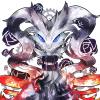Alright, so this has been bugging me a lot about Eclipse Phase so far. How does someone in Eclipse Phase develop their self of self and identity in the setting of Eclipse Phase? This kind of goes back to my earlier questions about growing up in Eclipse Phase but I guess it's a bit wider reaching than that.
So the question is, how do you develop who you are in Eclipse Phase when so much is subject to change at more or less a drop of the hat? Growing up in Eclipse Phase is hardly touched on at all, and without a good answer you don't really have a good starting point for developing a character's identity. You cannot base their identity off of their body, as bodies are interchangeable and you can never be sure you will get even the same type of body as the one you were born with (or accustomed to, if that's even possible in Eclipse Phase) or that you even have a genetic code even if you are a transhuman. You cannot even really base identity on the information on the Ego itself, as that is too subject to change (though to a lesser extent than bodies). So the question is, with all of this in mind, how do you develop your self of self in this setting? How do you give your character a "face" when they quite possibly will never actually have the same face twice? How do you give your character the spark of life, when you cannot use your own baseline understanding of life and identity development for the purposes of an Eclipse Phase character?
Welcome! These forums will be deactivated by the end of this year. The conversation continues in a new morph over on Discord! Please join us there for a more active conversation and the occasional opportunity to ask developers questions directly! Go to the PS+ Discord Server.
(Personal) Identity in Eclipse Phase
Tue, 2017-09-26 06:22
#1
(Personal) Identity in Eclipse Phase


- Hacker / Programmer: COG Aptitude, Infosec, Programming, Interfacing, Research, Hardware: Electronics, Hardware: Robotics, Academics: [Field]
- Face / Smooth Talker / Social Analyst: SAV Aptitude, Persuasion, Deception, Networking: [Fields] (more than one recommended), Kinesics, Intimidation, Protocol, Impersonation, Language: [Fields], Academics: Psychology, Disguise
- Thief / Traceur: REF Aptitude, Freerunning, Infiltration, [Climbing|Free Fall|Flight|Swimming] (more than one, depends on environment), Palming, Navigation, Disguise and/or Impersonation (maybe)
- Async: WIL Aptitude, Psi trait (obligatory), Sense, Control, Psi Assault, Psychosurgery and/or Academics: Psychology and/or Profession: Psychotherapy (to help deal with the stress), probably a few supplemental social skills
- Melee Combatant: SOM Aptitude, [Blades|Clubs|Unarmed|Throwing Weapons|Exotic Melee], Fray (more than usual), Kinesics, Hardware: Armorer, Medicine: Field Medicine, a relevant weapon or two (obligatory)
- Ranged Combatant: COO Aptitude, [Beam Weapons|Demolitions|Kinetic Weapons|Gunnery|Seeker Weapons|Spray Weapons|Throwing Weapons], Fray (more than usual), Hardware: Armorer, Medicine: Field Medicine, a relevant weapon, mods, and ammo (obligatory)
Support roles (should probably be mixed with another role except for NPCs, and always good to have):- Medic / Doctor: COG Aptitude, Medicine: [Field], Academics: Anatomy, Hardware: Implants, Hardware: Robotics
- Therapist / Psychosurgeon: COG and INT Aptitudes, Psychosurgery, Medicine: Psychiatry, Academics: Psychology, Profession: Psychotherapy
- Professor / Artist / Art Critic (per general field): COG and INT Aptitudes, Academics: [Fields], Language: [Fields], Art: [Fields], Hardware: [Fields], Networking: Researchers
- Investigator: INT Aptitude, Investigation, Research, Profession: Info Brokerage, Networking: Criminals, Language: [Fields]
- Mechanic: COG Aptitude, Hardware: [Fields], Academics: Engineering, Academics: Chemistry, Demolitions
- Pilot: REF and INT Aptitudes, Pilot: [Fields], Navigation, Gunnery (for anything with mounted weapons), Hardware: [Aerospace|Groundcraft|Nautical] (as appropriate)
[hr]On top of this, everyone absolutely needs Fray and Perception, in case you didn't come across the note to that effect in the core book. You are also going to want a Profession or other way of making money if there is a lull between campaign-related jobs - gotta keep the bills coming in somehow - and at least one Networking skill, probably one relevant to your background. Since it's unlikely you'll have someone covering [i]every[/i] spot individually, and you end up with a lot of points left over if you cover these, most characters end up pulling double duty in practice - occasionally triple. Also, only looking into these skills leaves some massive gaps - and zero redundancy can leave the party out of luck if something goes wrong with any one character or their morph, or if the party gets split up or something. Again, though, characters in Eclipse Phase are "whole people" a lot more than some other games, and (in my experience) almost always end up having some unique twists to them or combinations of facets that combine for a unique feel. After all, how many of [i]us[/i] can be reduced to a small handful of words? On top of their basic competencies, a character should in general have a few interests and generally other things to flesh them out - but often, these only become obvious after you've gotten a feel for who they are, making the specifics occasionally hard to pin down until you've got a "voice" in mind for them. You could also look to the aptitude templates offered in [i]Transhuman[/i]: Brawler, Dilletante, Extrovert, Inquisitive, Researcher, Survivor, Techie, Thrill Seeker - but those are more like one-word reductions of core personalities, matched to aptitudes. Hopefully this helps.